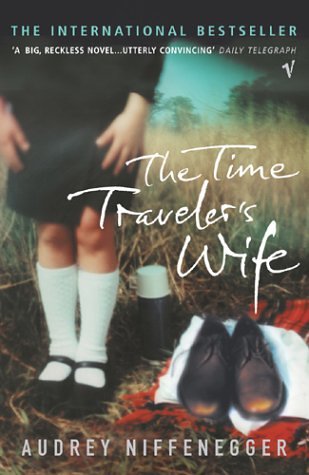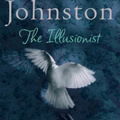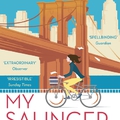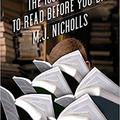Audrey Niffenegger: The Time Traveller's Wife

I have a strange attitude towards bestsellers. I read a lot of praise about them, hear some bits and pieces of the story, and finally come across a sentence or a shred of someone’s review which manages to break through the wall of my snobbishness and disinterestedness, and suddenly I become eager to read the book in question. In connection with The Time Traveller’s Wife, this moment came some time this spring, but I do not remember what exactly kindled my interest. Then a few months later one of my good acquaintances mentioned Niffenegger’s name and the word “postmodern” in the same sentence and from that point I wanted to read the novel as soon as possible.
Judging from the reviews and blog posts I had previously read about the novel, I presumed that the Time Traveller would be a somewhat mystical, somewhat hard to follow, wonderful but not slimy love story in which the characters use a lot of bad language. However, the book turned out to be rather different: it was not mystical, it was not somewhat but sometimes extremely hard to follow, it was not slimy but it was not wonderful either, and the characters did not use too much bad language for my taste.
One of the great advantages of reading bestsellers is that by the time I read them and post about them, several highly interesting reviews and posts are already all around the internet, so I do not have to bother with writing a story outline. So this time, I will only write about what I found good in the novel, and what I found bad.
Niffenegger’s novel made an unexpectedly good impression on me in the beginning. The preface of the novel in which first Clare, then Henry provide the reader with a short insight into their lives spent with continuous waiting, time travelling and aching with desire was simply perfect. The first couple of pages manage to convey a sense of all the suffering, difficulty, joy, helplessness, hope and bitterness which describe the relationship of Henry and Clare, and the combination of all these was sufficiently interesting for me to develop an active interest in the characters and their story.
However, after the promising start I quickly lost my grip on the story. Henry’s time travels, his disappearances, his meetings with his younger and older selves, and the fact that Henrys from different parts of the future kept appearing in Clare’s childhood – these were too much for my logical abilities to tackle. Or perhaps these elements puzzled me because I like to analyze and explain everything, and this is clearly impossible in this novel.
After reading some more I began to feel that possibly the whole storyline of time traveling and combining past and future has a symbolic meaning that does not necessarily have to be meant rationally, and from this point on I started to enjoy the book yet again. I think if we put aside the science fiction layer of the story, we can get an insight into the lives of two rather interesting characters and their truly unusual relationship. Despite its unusual and destined quality, this is an honest, real, subversive, self-destructive and ruthless relationship, and the time travels of Henry and the defenselessness and insecurity they entail signify both Clare’s desire to be alone and Henry’s attempts to escape from their relationship.
As it can be inferred from the title of the novel, the protagonist of the novel is not Henry and Clare, but Clare only. It is really tricky from the author that even though it seems as if Clare was the suffering party in the relationship whose life is basically spent with sitting around waiting for his involuntarily treacherous Henry, in reality everything happens according to Clare’s plans: as a child she decides that she will secure the man of her dreams for herself and she secures him; when she wants a child, albeit with much difficulty, she manages to give birth to one; and when she wants to be alone, she only has to wait a little and one of Henry’s time travels will provide her with the chance to indulge herself. This is more or less explicitly written out in a short chapter titled Secret, in which Clare tells the reader what she does when Henry is away and how much she enjoys occasionally being alone. I have never read in any romantic love story such a description of the way how the parties in a relationship (or one party at least) sometimes wish to be alone, even if it means that that the other person will quite probably have a very bad time during the period spent apart – just as Henry has quite unpleasant and sometimes even life-threatening experiences during his time travels. This is simply something a love-story usually does not dwell upon, so I had to conclude that The Time Traveller’s Wife is not a simple romantic story.
True, there are several romantic and erotic scenes in the novel, but despite these, and despite the whole time travelling mystique, I judge this novel to be fairly realistic, where the everyday struggles of life (such as how to share the housework) are just as emphatically present as the way Henry and Clare make romantic love to each other.
And now some words about the things I did not like or that disappointed me: first of all, for me the narrative was a bit hard to follow. The story is told by Clare and Henry in turns and at the beginning of every chapter the narrator is named. However, I got confused quite often as to who is doing the speaking and I had to turn back to the beginning of the chapter to find it out. It was not easy to tell apart Henry and Clare as neither of them had a completely unique voice which would have made it possible for me to know at once who the current narrator is.
Another thing which irritated me a bit was that I often felt that the novel promised more then it managed to deliver. This is especially so in the stories of the minor characters. There is a whole bunch of potentially highly interesting characters in the novel, but finally none of them is explored in any depth. For instance, I would have liked to read more about the anarchist Gomez, Clare’s psychotic mother, Henry’s ex-girlfriend Ingrid or Henry’s father but all of them were dwarfed by Henry and Clare. Of course one of the reasons for this might be that the novel is already quite long as it is. However, if Niffenegger had wanted to concentrate on her protagonists only, then perhaps she should not have introduced so many other characters.
Apart from all these, I liked this novel on the whole, and it also made me realize that it is not necessary for a bestseller to be as crappy as The Shadow of the Wind which I read not long ago and hated immensely. I can quite easily imagine that I will read Niffenegger’s new novel as well to see what else she can offer.





